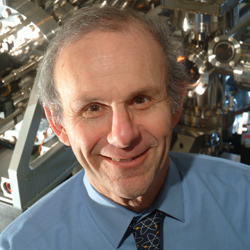David Seidman Receives ASM Gold Medal
The medal is one of the society’s most prestigious awards
Northwestern Engineering’s David Seidman has received the 2019 Gold Medal from ASM International, one of the society’s most prestigious awards.
Established in 1943, the Gold Medal recognizes outstanding researchers in the field of materials science and engineering who have an exceptional ability to diagnose and solve diversified materials problems. The award honors Seidman “for quantitative applications of field-ion microscopy and atom-probe tomography for solving a very broad range of materials problems from different materials classes in conjunction with other characterization tools.”
 Seidman will officially receive the medal at MS&T19, the annual materials science conference co-organized by ASM International, the American Ceramic Society, Association for Iron and Steel Technology, and TMS (The Minerals, Metals & Materials Society).
Seidman will officially receive the medal at MS&T19, the annual materials science conference co-organized by ASM International, the American Ceramic Society, Association for Iron and Steel Technology, and TMS (The Minerals, Metals & Materials Society).
“I am elated over this award as it recognizes my many scientific and engineering efforts over a long period of time, which commenced at Cornell University and are still ongoing at Northwestern,” Seidman said.
Seidman is a Walter P. Murphy Professor of Materials Science and Engineering and the founding director of the Northwestern University Center for Atom-Probe Tomography (NUCAPT), the largest atom-probe tomography group in the United States. NUCAPT’s equipment gives researchers the ability to see the internal structures of materials — on the subnano- to nanoscale — to help them better understand the materials’ properties and how those properties have temporally evolved. This information can be used to improve various materials properties, such as making them lighter and stronger.
“NUCAPT has educated and trained undergraduates, graduate students, and post-doctoral fellows in the art and science of atom-probe tomography, enabling them to obtain different educational degrees and to write articles for the archival literature based on their research activities,” Seidman said. “That gives me a very good feeling.”
Seidman’s research aims to understand physical phenomena in a wide range of material systems on an atomic scale. His research group uses highly sophisticated microscopy and spectroscopy instrumentation to study interfaces on a subnanoscale level. He is currently using these tools to develop high-temperature cobalt-based alloys for use as turbine blades in aircrafts and for producing electricity, and to study the temporal evolution of aluminum-scandium alloys on the subnanoscale enabling their use at very elevated temperatures, to understand the temporal evolution of the nanostructures of model nickel-based superalloys, and to study silicon nanowires that are processed in new ways.
Seidman has received several awards, including being twice selected as a John Simon Guggenheim Memorial Foundation Fellow and receiving an Alexander von Humboldt Stiftung Prize. He also has received an IBM Faculty Research Award, the Materials Research Society’s David Turnbull Lecture Award, ASM International’s Albert Sauveur Achievement Award, the Max Planck Research Award from the Alexander von Humboldt Foundation and Max Planck Society, and the Robert Lansing Hardy Gold Medal and the Robert Franklin Mehl Award from TMS.
He is a fellow of the American Academy of Arts and Sciences, American Association for the Advancement of Science, Materials Research Society, TMS, American Physical Society, International Field-Emission Society, Microscopy Society of America, and ASM International.